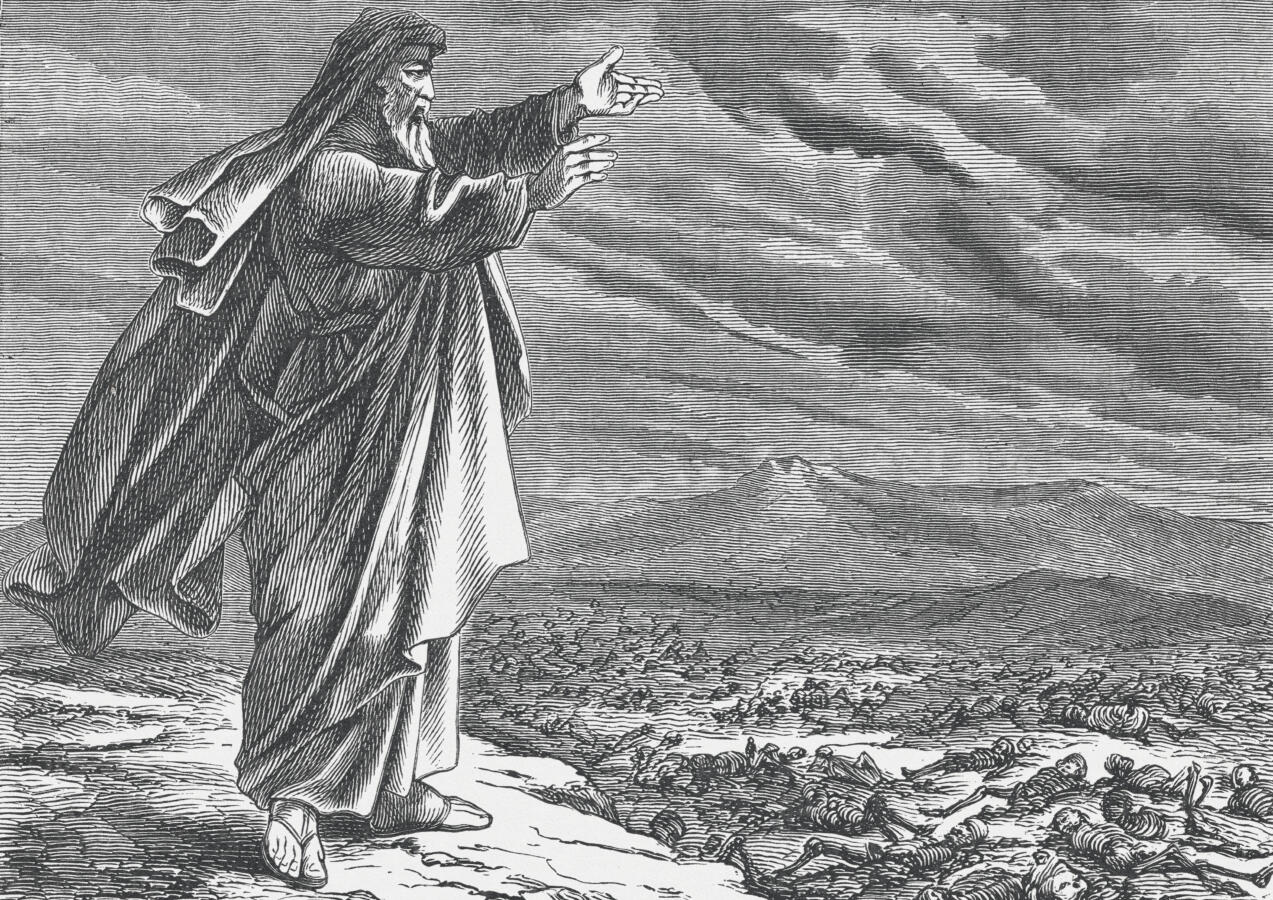In the freezer aisle of the grocery store, you may find packages of bread bearing a label that reads “Ezekiel 4:9.” Supposedly, this verse from the book of Ezekiel gives the recipe for a wholesome, multi-grain loaf of bread.
If you look up the verse, it reads: “Take wheat, barley, beans, lentils, millet, and emmer. Put them into one vessel and bake them into bread. Eat it as many days as you lie on your side: three hundred and ninety.”
Why is God telling Ezekiel to lie on his side for over a year while he eats the bread? Keep reading and the story gets stranger and stranger.
God asks Ezekiel to do a series of unusual things, each with a specific meaning. He should take a brick, draw Jerusalem on it, and then pretend to attack the miniature city. He should lie on his left side for 390 days as punishment for 390 years of sinning in the northern kingdom of Israel. Then he should lie on his right side for 40 days as punishment for 40 years of sinning in the southern kingdom of Judah. God is very clear about the ratio: “I impose on you one day for each year.” Ezekiel 4:6
With your help, My Jewish Learning can provide endless opportunities for learning, connection and discovery.
Finally, the special bread. God commands, “‘Eat it as a barley cake; you shall bake it on human excrement before their eyes.” Ezekiel is understandably upset about the idea of eating food cooked over a fire that burns human excrement. He negotiates with God to use cow dung instead.
What is God doing? What is Ezekiel doing? Why does this strange story about food, excrement, and extreme acts of lying down appear in the Bible at all?
Prophets throughout the Hebrew Bible perform symbolic actions, like Ezekiel does here. God commands these acts as a kind of holy attention-seeking. Prophets are conduits for messages from God to the people of Israel. Sometimes they communicate the message through poetry or through dramatic confrontations with political leaders. And sometimes they lie on one side of their body for 390 days.
We might imagine Ezekiel performing these actions in the heart of Jerusalem, warning that the beautiful and holy city around him will be destroyed. But actually, Ezekiel becomes a prophet when he is already in exile. In the opening verse of the Book of Ezekiel, we learn that God gives him his first prophetic vision “in the community of exiles by the Chebar Canal” — that is, in Babylonia.
Ezekiel prophesies at a moment of extreme tension and uncertainty. The Babylonian empire has been threatening Jerusalem for some time. A first wave of Jewish leaders, including Ezekiel himself, has already been driven into exile. What Ezekiel predicts is that things will go from bad to worse. No compromises or intermediate measures are going to save the city. Jerusalem, including the holy Temple, will be completely destroyed.
In Babylonia, Ezekiel is part of a community of former leaders and wealthy people who have experienced extreme whiplash: from the heights of society in their homeland to the depths of exile abroad. His message of bad news might be a hard sell for these already bereaved and vulnerable exiles. And perhaps that is why Ezekiel, at God’s urging, takes ever more extreme measures to gain their attention.
We might compare Ezekiel’s actions to performance art. Like a performance artist, Ezekiel’s actions would be considered extremely strange in any normal context. Understanding their meaning requires being present with him in space and time; the message lies not just in what he does, but how he does it. And like many performance artists, Ezekiel provides an easy target for mockery. He gets your attention, but he can’t actually convey what he intends without you taking him at least a little bit seriously.
What exactly does Ezekiel (or God) expect the exiles to do with this message? They can’t take up arms to protect Jerusalem. They are poor and defeated and stuck in Babylonia. Jerusalem will be leveled. The message would seem to be aimed at shaking the exiles from their denial and getting them to recognize that the destruction was not random: God is punishing the people for their sins. If this is true, then in some way they still control their fate. Accept their punishment, and the people can still in the future return to their land.
Ezekiel intervenes at a crucial inflection point in the history of the Jewish people. Every other ancient people conquered by a more powerful nation eventually came to accept the conquering nation’s god. If the Babylonians destroyed your temple, then their Marduk must be more worthy of respect than the divinity that was supposed to protect you. The Jews, starting with this advance group of exiles, reject this way of thinking. Their God is the only God. When they suffer, it must be by God’s design and for a reason that is intended to help them grow.
Ezekiel’s prophecies grow more hopeful over the course of the book, even if they never get less strange. His most famous vision presents a valley full of dry bones. At God’s urging, Ezekiel says to them, “O dry bones, hear the word of the Lord! Thus said the Lord God to these bones: I will cause breath to enter you and you shall live again. I will lay sinews upon you, and cover you with flesh, and form skin over you, and I will put breath into you, and you shall live again. And you shall know that I am the Lord!” Ezekiel 37:4-6
This vision becomes the very image of God’s promise to redeem the people. They will regain hope, individually and as a community, when things seem most dire. Ezekiel communicates this message in his inimitable style: earthy, bodily, almost gothic, and impossible to drive from your mind.



